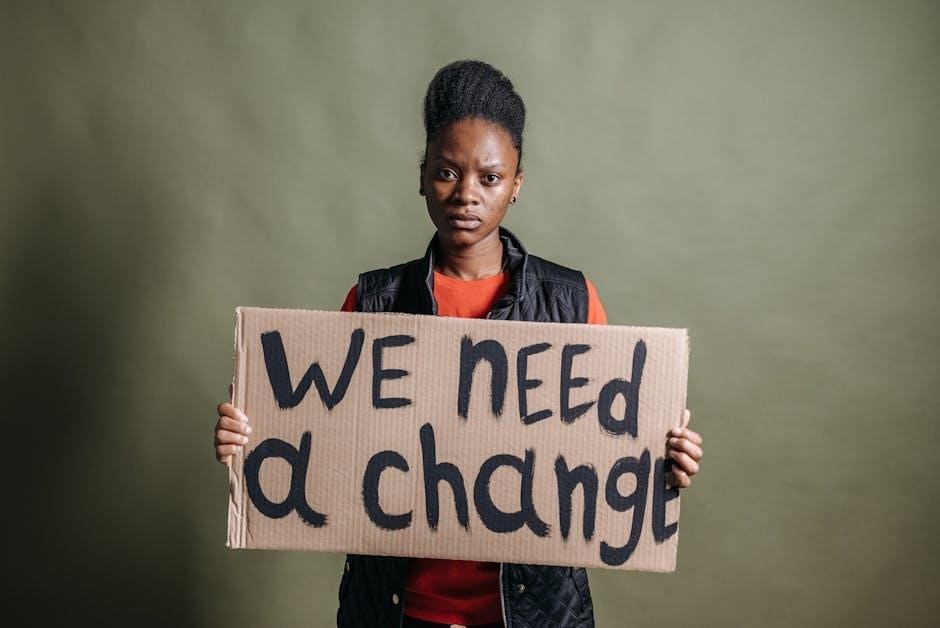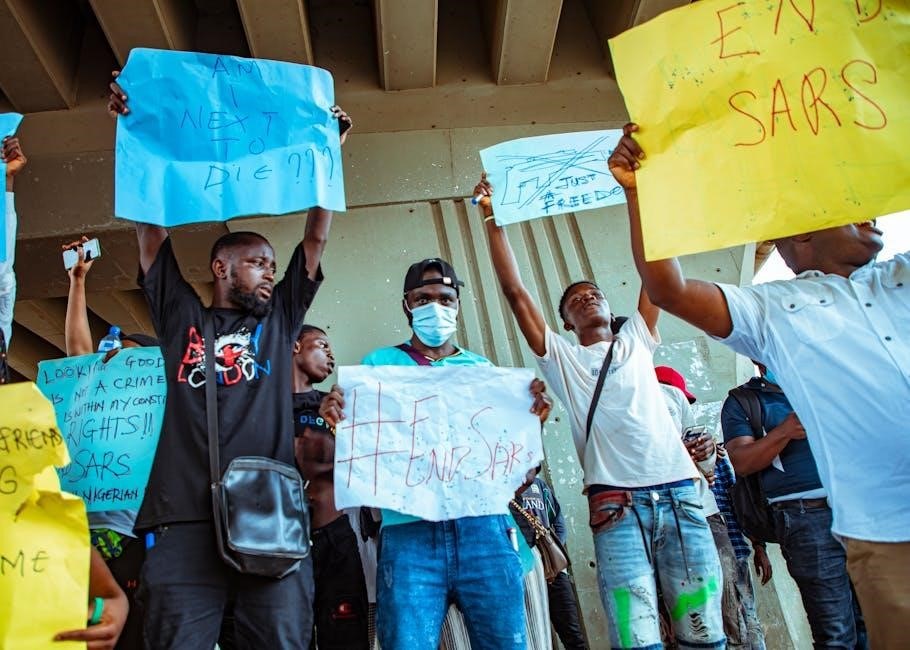“Speaking of Courage” explores Norman Bowker’s emotional journey, delving into guilt, survival, and the true meaning of courage, resonating deeply with themes of war and personal struggle․
Overview of the Book and Its Significance
“Speaking of Courage” by Tim O’Brien is a poignant exploration of Norman Bowker’s post-war struggles, delving into themes of guilt, survival, and the true essence of courage․ As part of The Things They Carried, it highlights the emotional and moral challenges faced by veterans, offering a deeply human perspective on war’s aftermath․ The book’s significance lies in its ability to bridge personal narratives with universal truths, making it a powerful commentary on the complexities of courage and its many forms․ Its relevance endures as a vital exploration of human resilience and the enduring impact of conflict;

The Concept of Courage in “Speaking of Courage”
Courage in the book is portrayed through Norman Bowker’s internal struggles, emphasizing resilience and moral strength amidst guilt and vulnerability, highlighting its complexity and depth․

Psychological Perspectives on Courage
Psychologically, courage in “Speaking of Courage” is depicted as the ability to confront internal fears and emotional pain․ Norman Bowker’s narrative illustrates how guilt and survivor’s guilt shape his understanding of courage, highlighting the mental struggle to reconcile past actions with present emotions․ The story suggests that courage is not just about bravery in the face of physical danger but also about enduring psychological turmoil․ Bowker’s inability to speak openly about his experiences reflects the internalized burden of courage, where the mind grapples with shame and regret․ This perspective emphasizes that true courage often lies in facing one’s inner demons rather than external threats․
Philosophical Views on Courage
Philosophically, “Speaking of Courage” delves into the essence of courage as a moral and existential virtue․ Drawing from Aristotle’s concept of courage as a mean between fear and confidence, the narrative portrays Norman Bowker’s struggle to reconcile his wartime actions with societal expectations․ Existentialist views emphasize courage as the freedom to choose and act responsibly, yet Bowker’s paralysis reflects a failure to embrace this freedom․ His silence and inability to articulate his experiences highlight the philosophical tension between courage as action and courage as moral integrity․ The story thus invites reflection on courage as both a personal and universal ethical imperative in a post-war world․

Cultural and Religious Relevance of Courage

Culturally, courage is often tied to societal expectations and values, varying across different traditions․ In “Speaking of Courage,” Norman Bowker’s inability to articulate his war experiences reflects a cultural disconnect between battlefield heroism and civilian understanding․ Religiously, courage can embody faith and moral conviction, yet Bowker’s silence highlights a spiritual void․ The narrative underscores how cultural and religious frameworks shape perceptions of courage, often leaving individuals like Bowker grappling with identity and purpose․ These themes resonate universally, bridging gaps between personal and collective understandings of bravery in a complex, multicultural world․
Norman Bowker’s Story in “Speaking of Courage”
Norman Bowker’s narrative explores his haunting war memories, guilt over Kiowa’s death, and struggles to articulate his experiences, ultimately leading to his tragic suicide․
Norman Bowker’s Background and War Experiences
Norman Bowker, a young soldier from Iowa, served in Vietnam, enduring the harsh realities of war․ His experiences, including the death of Kiowa, left him deeply scarred․ Returning home, he struggled to reconcile his past with civilian life, overwhelmed by survivor’s guilt and the inability to share his story․ The war’s trauma haunted him, leading to his eventual suicide, highlighting the long-lasting psychological toll of combat․ His story, as told in “Speaking of Courage,” offers a poignant reflection on the challenges veterans face in post-war life․
Guilt and Survivor’s Guilt in Norman Bowker’s Narrative
Norman Bowker grapples with profound guilt and survivor’s guilt, stemming from Kiowa’s death in Vietnam․ Haunted by memories, he blames himself for the tragedy, unable to reconcile his survival with Kiowa’s loss․ This emotional burden isolates him, making it impossible to connect with others or find peace․ His guilt becomes a defining characteristic, overshadowing his life and ultimately leading to his tragic end․ The narrative vividly portrays the psychological toll of war, illustrating how survivor’s guilt can consume and devastate individuals long after the battlefield․
The Legacy of Norman Bowker’s Story
Norman Bowker’s story leaves a profound legacy, highlighting the lasting impact of war on soldiers’ lives․ His struggles with guilt and isolation resonate universally, offering insight into the psychological scars of veterans․ The narrative serves as a powerful reminder of the human cost of conflict and the importance of addressing mental health․ Bowker’s tragic end underscores the need for support systems for returning soldiers․ His journey, though deeply personal, became a symbol of the broader challenges faced by veterans, ensuring his story continues to educate and empathize with those affected by war’s aftermath․

Themes in “Speaking of Courage”
The book explores themes of moral courage, physical bravery, and the emotional challenges of homecoming, highlighting the complexities of human resilience and personal growth․

Moral Courage vs․ Physical Courage
In “Speaking of Courage,” moral courage is portrayed as the strength to stand up for what is right, even in the face of societal or emotional challenges․ Physical courage, on the other hand, involves overcoming fear in dangerous or life-threatening situations․ Norman Bowker’s story highlights the internal struggle of moral courage, as he grapples with guilt and self-blame․ The book illustrates how moral courage can be more profound, requiring individuals to confront their conscience and societal expectations․ This dichotomy underscores the complexity of courage, showing that true bravery extends beyond physical acts to encompass emotional and ethical resilience in everyday life․
Homecoming and Adjustment After War
Norman Bowker’s return to Iowa after the war underscores the challenges of homecoming and adjustment․ The novel portrays his struggle to reconnect with civilian life, burdened by memories and guilt․ Bowker’s experience reflects the broader theme of veterans’ readjustment, where the emotional toll of war lingers; The story illustrates how societal expectations and personal trauma collide, making it difficult for soldiers to find their place back home․ This narrative serves as a poignant reminder of the invisible wounds of war and the ongoing quest for healing and understanding in post-conflict life․

The Role of Public Speaking as an Act of Courage
Public speaking requires overcoming fear, empowering individuals to voice their truths and stand by their beliefs, embodying moral courage in sharing ideas and perspectives openly․
Strategies for Overcoming Fear in Public Speaking
Overcoming fear in public speaking involves embracing fear as energy, preparing thoroughly, and viewing speaking as a conversation․ Practicing in front of others, seeking feedback, and conducting dress rehearsals build confidence․ Focusing on the message rather than perfection helps shift the emphasis from self to audience connection․ Additionally, reframing nervousness as excitement and using relaxation techniques can calm nerves․ These strategies empower individuals to transform fear into a positive force, fostering courage and clarity in communication․

Courage in the Context of Education and Personal Growth
Courage in education fosters personal growth by encouraging individuals to face challenges, embrace moral values, and develop resilience through literary examples and real-life experiences․
Teaching Courage Through Literature and Experience
Teaching courage through literature and experience enriches personal growth by exploring moral values and resilience․ Norman Bowker’s story in “Speaking of Courage” exemplifies how war experiences shape courage․ Literature provides a platform to discuss bravery, guilt, and survival, fostering empathy and reflection․ By engaging with such narratives, educators can help students connect with real-life struggles, promoting a deeper understanding of courage․ This approach encourages individuals to embrace challenges and develop resilience․ The integration of literary analysis with personal experiences creates a holistic learning environment, empowering individuals to confront fear and adversity with moral integrity․ Courage, thus, becomes a lived experience rather than an abstract concept․

Courage in a Complex and Changing World
Courage in today’s complex world involves facing moral challenges, societal pressures, and uncertainty while standing firm on one’s convictions, adapting bravery to evolving circumstances and values․
Cultural Variations in the Perception of Courage
Cultural variations shape how courage is perceived and expressed globally․ In Western societies, courage often aligns with individual heroism and moral conviction, while Eastern cultures may emphasize collective honor and resilience․ Some societies view courage as standing up for religious beliefs, even in the face of criticism, reflecting the idea that publicly identifying with faith can be an act of bravery․ These differences highlight how courage is a universal yet context-dependent value, influenced by cultural norms, traditions, and societal expectations․ Understanding these variations enriches the exploration of courage in works like “Speaking of Courage,” where personal and cultural struggles intersect․
Courage and Religion in Modern Society
Courage and religion intersect in modern society, where publicly identifying with faith often requires moral bravery, especially amid societal skepticism or criticism of religious beliefs․
Publicly Identifying with Religion as an Act of Courage
In modern society, openly identifying with religion often demands courage, as believers may face skepticism or judgment․ This act of faith requires standing firm amidst criticism, reflecting moral bravery․ The decision to express religious beliefs publicly can be seen as a form of courage, especially when societal norms increasingly question religious values․ It involves risking social exclusion or misunderstanding, yet remaining true to one’s convictions․ This aligns with themes of moral courage explored in Speaking of Courage, where individuals confront inner and external challenges to uphold their beliefs, even in adversarial environments․ Religion, thus, becomes a testament to personal strength and resilience․
